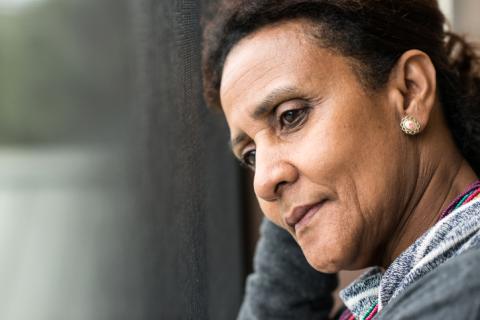October Is National Depression Awareness Month
Depression can result from a case of COVID-19, and that is only the beginning. Fear of the virus, social isolation as we protect ourselves from exposure, economic uncertainty and even the political climate all combine to raise the risk.
Older adults are at a higher risk of depression. Depression is a chemical imbalance in the brain that for seniors can be worsened by poor nutrition and inactivity, and by stressful life events such as the loss of a spouse, poor health, chronic pain—even retirement. Certain common medications that seniors take can worsen depression. And loneliness and social isolation are a top cause of depression among seniors, making today’s situation even more dire.
According to the World Health Organization (WHO), depression is the leading cause of poor health and disability worldwide. More than 300 million people are living with the condition, which is characterized by persistent sadness, feelings of hopelessness, lack of energy, and loss of interest in activities that once brought a person joy. WHO experts say depression increases the risk of substance abuse and suicide, and a host of diseases.
Experts from the University of California San Francisco concur. They examined the data from 15,000 older people and found that depression raises the risk of heart disease, hypertension, arthritis, back pain and digestive disorders. “Participants with high levels of anxiety and depression were found to face 65 percent increased odds for a heart condition, 64 percent for stroke, 50 percent for high blood pressure and 87 for arthritis, compared to those without anxiety and depression,” noted study author Aoife O’Donovan, Ph.D. “These increased odds are similar to those of participants who are smokers or are obese.”
Depression can be treated
Some seniors believe that depression is “just a part of growing older.” But it isn’t. If you or an older loved one are experiencing the symptoms of depression, talk to the doctor. Depression is treatable! Treatment might include counseling, a support group, treating underlying health conditions and in some cases, antidepressant medications. Many doctors and health care professionals today are conducting telemedicine appointments, making it easier for patients to connect with them.
Even as we’re weathering the pandemic, we can make lifestyle changes that give us a mood boost:
Improve nutrition. Seniors have been eating more prepackaged, less healthy food these days. We can order grocery delivery, or takeout food from our favorite restaurants that are practicing no-touch delivery. Senior meal programs, many of which were temporarily slowed at the beginning of the pandemic, are mostly up and running now. Contact your local senior services agency to learn more.
Add more physical activity to your days. Exercise might be the No. 1 prescription for depression. Go for walks if it’s safe. See if your local gym or senior center offers virtual exercise classes. Check out exercise videos. Ask your doctor for a “prescription” for an exercise program that’s right for you.
Have your medications reviewed. Depression is a possible side effect of many of the prescription and even nonprescription drugs seniors take. Discuss this with your doctor or pharmacist.
Spend more time with others. Socialization is another top “cure” for depression. Today, of course, that’s not so easy for many of us. Following your doctor’s advice, arrange for safe, socially distanced gatherings with others. If you’re not very tech savvy, ask a friend or loved one to help you get online for some virtual socializing. Or pick up the phone. If you have a senior loved one who has become isolated, reach out. We all need to stick together to weather this challenge.
Depression is nothing to be ashamed of. The WHO reports that fear of stigma can stand in the way of accessing evaluation and treatment. Says WHO expert Dr. Shekhar Saxena, also of the Harvard T. H. Chan School of Public Health, “For someone living with depression, talking to a person they trust is often the first step towards treatment and recovery.”
The information in this article is not intended to take the place of your healthcare provider’s advice. Talk to your doctor about your risk of COVID-19 and how to be safe. If you are experiencing symptoms of depression, talk to your doctor right away.
